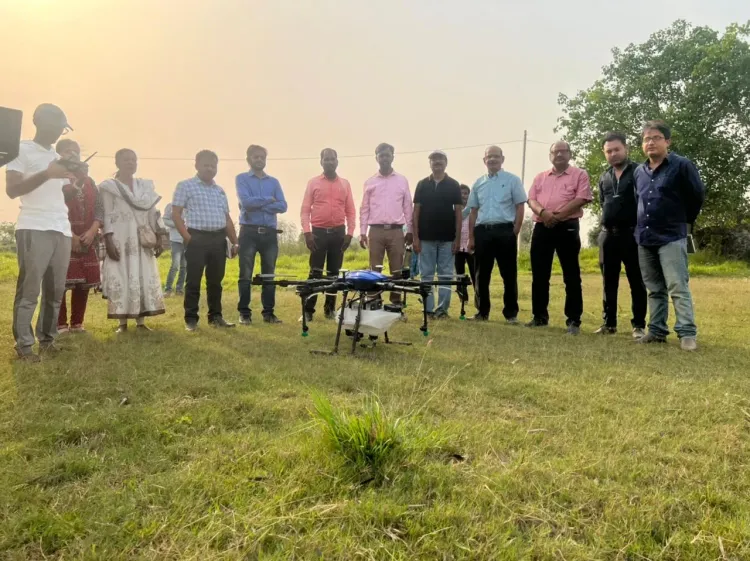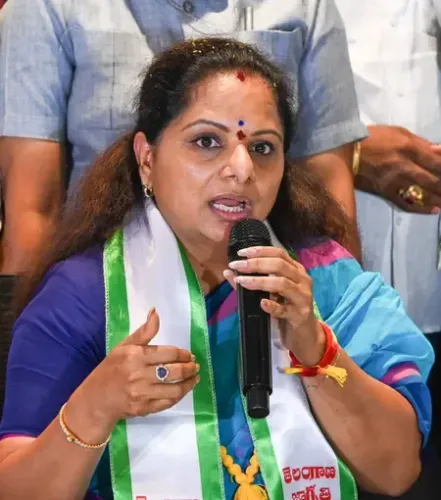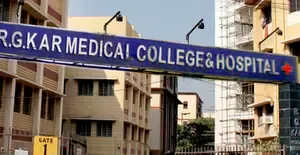How have KVKs Empowered Over 58 Lakh Indian Farmers with the Latest Scientific Skills?

Synopsis
Key Takeaways
- KVKs have trained over 58 lakh farmers from 2021 to 2024.
- Annual training numbers are steadily increasing.
- KVKs focus on local agro-climatic conditions for effective training.
- Key initiatives support farmer skill enhancement in various agricultural sectors.
- The Soil Health Card Scheme promotes informed crop planning.
New Delhi, Sep 30 (NationPress) As part of India's agricultural strategy aimed at enhancing skills directly for farmers, Krishi Vigyan Kendras (KVKs) are crucial in connecting research with practical application through hands-on training, demonstrations, and vocational courses customized for local agro-climatic circumstances. Between 2021 and 2024, KVKs have successfully trained 58.02 lakh farmers, as reported by the Ministry of Agriculture and Farmers Welfare on Tuesday.
The number of farmers receiving training through KVK initiatives has shown a consistent annual increase, rising from 16.91 lakh farmers in 2021–22 to 21.56 lakh in 2023–24. Furthermore, from 2024–25 until February 2025, an additional 18.56 lakh farmers were also trained.
These statistics highlight the extensive and reliable network of KVKs in equipping farmers with essential skills in crop management, soil health, animal husbandry, and related activities. By tailoring training to local realities while incorporating scientific methodologies, KVKs have emerged as one of the leading platforms for enhancing farmer capabilities, ensuring the application of scientific knowledge results in tangible improvements and long-term resilience in agriculture.
Institutions like KVKs and initiatives such as the Agricultural Technology Management Agency (ATMA), Skill Training of Rural Youth (STRY), Sub-Mission on Agricultural Mechanization (SMAM), and the Pradhan Mantri Kaushal Vikas Yojana (PMKVY) have established robust training frameworks. These sector-specific interventions in horticulture, livestock, soil management, and food processing are integrating skill development into their operational structures.
Altogether, these initiatives underscore a definitive vision: empowering farmers through skill enhancement is crucial for increasing productivity, enhancing incomes, and nurturing a resilient agricultural sector.
ATMA has aided states in revitalizing their extension systems, reaching approximately 1.27 Crore farmers from 2021 to 2025. This scheme fosters a decentralized, farmer-centric extension system across the country, aimed at supporting state governments in providing the latest agricultural technologies and best practices.
The Soil Health Card Scheme has been instrumental in assisting farmers with informed decisions regarding crop planning and fertilizer use. As of July 24 this year, over 25.17 crore soil health cards have been distributed nationwide, along with more than 93,000 farmer training sessions, 6.8 lakh demonstrations, and numerous awareness campaigns. These efforts have promoted balanced nutrient management practices among farmers, leading to enhanced soil health and sustainable agricultural productivity.
The government has also integrated skill development within key national programs. The Pradhan Mantri Kaushal Vikas Yojana (PMKVY) prioritizes agriculture as a key sector, incorporating agriculture and allied industries into India's main skilling framework. Since its launch in 2015 until June 30, 2025, over 1.64 Crore individuals have been trained under the PMKVY scheme, with more than 1.29 Crore certified.
Special emphasis has been placed on equipping the younger generation of farmers for new opportunities in agriculture. The STRY program offers short-term, skill-based training lasting about seven days for rural youth and farmers in agriculture and allied sectors.









